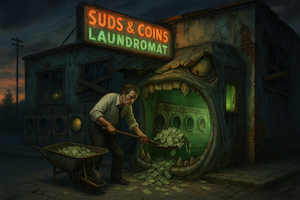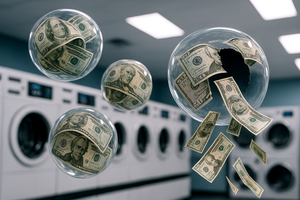What do successful operators discuss when they're together?
October's Laundry CEO Forum brings together proven multi-location laundry operators and world class strategic minds.
James Keyes, former CEO of Blockbuster and 7-Eleven.
Marcus Sheridan on AI and exclusive C-Suite leadership workshop. Minsoo Pak, EY Partner and certified futurist, on the future of business transformation.
Richard Vauge, economist on economic trends affecting industries.
Proven operators sharing what actually works: profitable P&D pricing, scaling strategies, differentiation that drives revenue, and more.
Plus, an exclusive private C-Suite off-site dinner experience.
73% of attendees operate multiple locations. This is the caliber of future-focused conversation you've been seeking.
"Finally, a detailed event designed for Laundry Owners by Laundry Owners."
— Multi-Store Owner/Operator
Reserve your seat today.
Limited capacity for this gathering.
I came across something interesting recently that got me thinking about our industry in a different way. Bloomberg did a deep analysis on “Zombie Companies", businesses that are technically operating but aren't thriving.¹ The more I learned about their criteria, the more I wondered, what if we applied this viewpoint to laundromats?
The Zombie Company Framework
According to Bloomberg's research, zombie companies are businesses that have been operating for at least ten years with sustained underperformance. They're generating just enough revenue to service their debt interest, but can't pay down the principal.² The numbers are crazy, nearly 20% of large U.S. publicly traded firms became zombies by 2020, accumulating $1.36 trillion in debt.³
These aren't fly by night operations. They're real companies with revenue each year that are having serious financial issues. The key characteristic? They're dependent on refinancing old debt for their continued existence rather than growing or improving their operations.
What caught my eye was how easy access to capital since 2008 has allowed companies to "kick the can down the road." Companies that probably should have failed years ago are still limping along, sustained by cheap credit.
The Information Gap
Here's where it gets interesting for our industry. Bloomberg can identify these zombie patterns because public companies have to disclose their financials through SEC filings, quarterly reports, and audited statements. Every number is scrutinized, every debt obligation is transparent.
But laundromats? We're operating in the small business sector where 42% of owners admit they have limited or no financial literacy before starting their businesses, and 60% of small business owners feel they don't have a good understanding of their accounting and bookkeeping.⁴ Add the cash heavy nature of our sales, and you've got a complete information blackout.
I can't tell you how many stories I've heard from owners who bought laundromats without complete financials, or had to piece together the business's performance from incomplete records. This has happened far more than people want to admit.
What If We Applied Zombie Criteria to Laundromats?
Here's what got me thinking. What if we took Bloomberg's zombie company characteristics and looked at our industry through that lens?
Very little or no money to reinvest in the business to improve or grow it. How many laundromats have you seen that look exactly the same as they did five or ten years ago? Same machines, same paint, same worn out setup?
High debt levels from equipment loans, SBA debt, and refinancing cycles. In an equipment heavy business like ours, this one hits close to home.
Always "one more loan" to turn it around, or personal funds to keep it going, hoping to eventually reach profitability. The eternal optimism that the next investment will finally make the difference.
Stifled growth generating the same revenue year after year, unable to invest in improvements that could actually drive business forward.
Reduced productivity from aging equipment and deferred maintenance that slowly erodes both client experience and operational efficiency.
Thinking About the Thinking of Laundry
When you realize that our industry operates in a information vacuum compared to others, you start to question everything you thought you knew about "success" in the laundry business.
The Uncomfortable Questions
If I had to guess based on what I've observed and heard, I'd estimate maybe 20 to 30% of the 29,000 laundromats in the country might fit these patterns. That would mean we're potentially talking about 6,000 to 8,700 laundromats that are technically "successful" but are really just treading water.
What if the famous 95% success rate we always hear about includes businesses that are just barely getting by rather than actually thriving? What if some of those high priced listings with impressive self service and WNF revenue are actually zombie operations dressed up for sale?
What if buyers are unknowingly purchasing businesses that can only make their monthly payments without any real profit left over? Without the transparency that public companies have, how would anyone know?
The Barnes & Noble Lesson
The Bloomberg piece featured Barnes & Noble as a zombie company that actually turned itself around. But here's the thing, we only know their recovery story because they were public. Their financials were scrutinized, their struggles were documented, and their turnaround strategies were transparent.
How many laundromat "turnaround stories" are actually just zombie operations changing hands? Without financial transparency, it's impossible to tell the difference between a genuine business transformation and a zombie getting a new owner to feed it.
The Real Question
If laundromats were publicly traded and had to disclose financials like Boeing or Macy's, what would we discover? Would all the online hype about it being a great passive business, boring business, or best business to own hold up under that level of scrutiny?
I'm not saying every struggling laundromat is a zombie, that the industry is in crisis, or laundromats aren’t good businesses. But maybe it's time we started asking harder questions about what "success" actually means when the books are closed and the real numbers are hidden.
In an industry where solid financial data doesn't exist, how do we separate what's actually thriving from what's just surviving?
That's all I got for you today.
Waleed
Join me on Linkedin, YouTube, or X (Twitter)
Echoing the thoughts of Wendelin Van Draanen.
It's easy to look back and see it, and it's easy to give the advice. But the sad fact is, most people don't look beneath the surface until it's too late.
Footnotes:
¹ Why 'Zombie Companies' Are a Drag on the US Economy - Bloomberg Video
² Zombie Company - Wikipedia
³ America's Zombie Companies Rack Up $2 Trillion of Debt - Bloomberg
⁴ 20 Small Business Financial Literacy Statistics for 2025 - QuickBooks
1. The Lean PUD StartUp Blueprint (FREE): Launch a lean pickup & delivery business for under $2,000 with the free 7-day email course covering suppliers, tech stack, marketing, and implementation. Get the blueprint
2. Wash Weekly Newsletter (FREE): Every Sunday, unlock insights to grow your profits and become a market leader in just 5 minutes. Subscribe here
3. Laundry CEO Podcast (FREE): Learn from successful laundry owners who share their stories and strategies to help you excel in the industry. Watch now - Listen now





